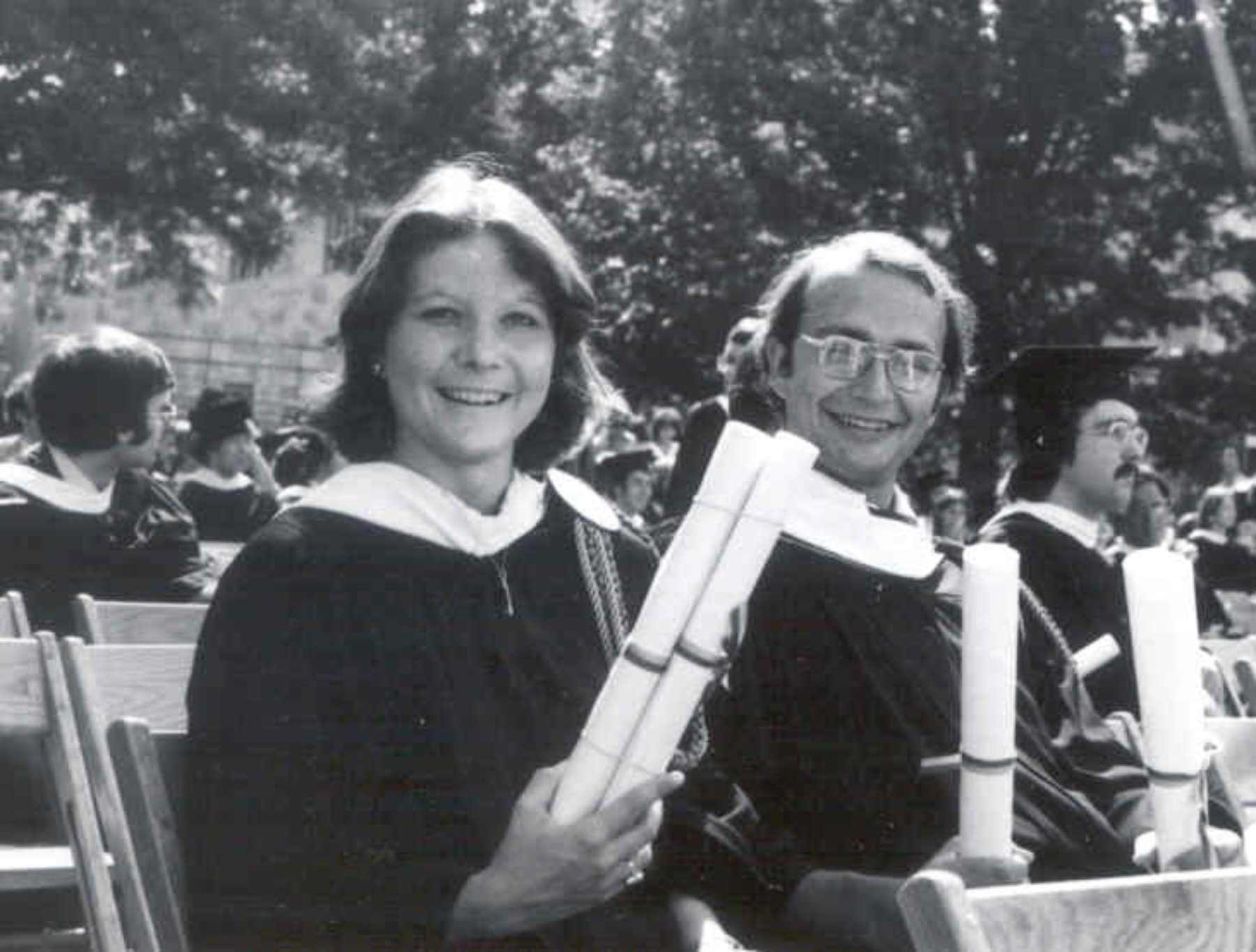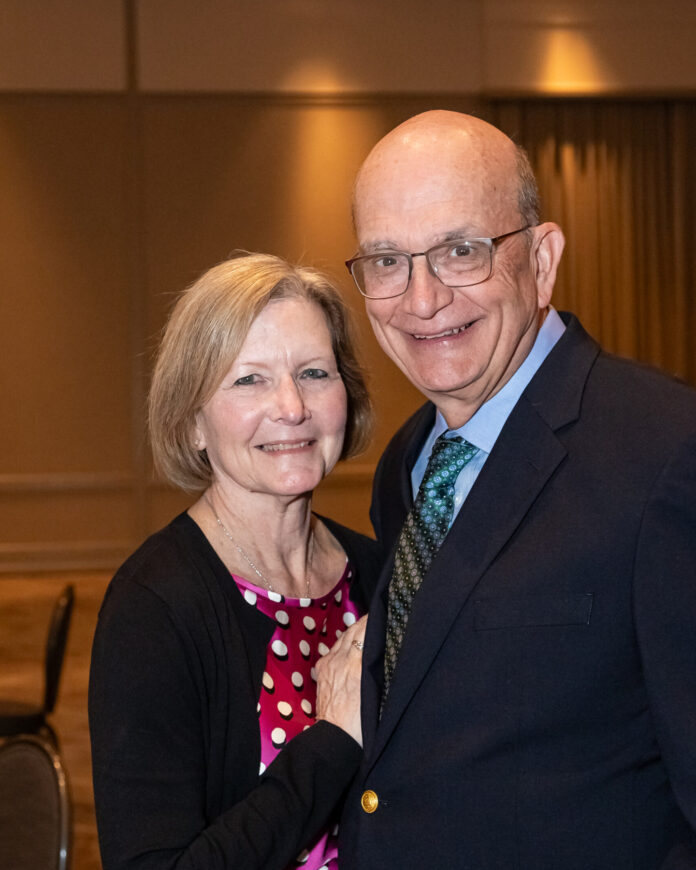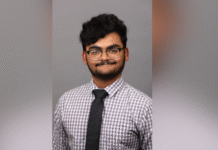Tim Floyd, from Atlanta, and Daisy Hurst, from Savannah, met in a classroom during their senior year of college. They began dating in the fall, were engaged by spring, and married in August after graduating from Emory University with the class of 1977. That September, they both began law school at the University of Georgia.
The Floyds each earned their bachelor’s degrees in political science, summa cum laude, and master’s degrees in political science from Emory. They were two of only three students in a pilot program that allowed participants to complete graduate-level coursework and a master’s thesis during their final undergraduate year. These courses counted toward both their Bachelor of Arts and Master of Arts degrees, enabling them to earn both simultaneously.
In 1980, they each earned a Juris Doctor degree from the University of Georgia School of Law, cum laude, while serving on the Georgia Law Review — Tim as editor-in-chief and Daisy as articles editor.
Both Floyds started their careers at Atlanta law firms — Daisy at Alston, Miller & Gaines (now Alston & Bird) and Tim at Sutherland, Asbill & Brennan — before moving into roles as law faculty.
After serving on the faculties of the University of Georgia School of Law and Texas Tech University School of Law, the Floyds moved to Macon in 2004 when Daisy accepted the position of dean at Mercer University School of Law. Tim worked as a visiting professor at Georgia State University College of Law for two years before joining the Mercer faculty in 2006.
Daisy, who is admitted to the State Bars of Georgia and Texas (as is Tim), served as dean from 2004 to 2010 and again from 2014 to 2017. In 2010, she became University Professor of Law and Ethical Formation. Her scholarship includes legal ethics, professionalism, civil procedure, evidence and remedies, with a particular focus on how higher education shapes the ethical development of lawyers.
“I taught alongside Daisy for many years and can personally attest to the impact she had on her students,” law professor Pat Longan said. “She told them her goals were to help them excel professionally, act ethically and live fulfilling lives. Through both her teaching and her example, Daisy achieved those goals for generations of Mercer students.”
Tim was appointed to Mercer’s Tommy Malone Distinguished Chair in Trial Advocacy in 2014. He taught courses in criminal law, civil procedure and legal ethics. Until 2023, he directed Mercer Law’s experiential education program, which he developed to include a wide range of clinical and externship opportunities. He has authored numerous scholarly articles and three books — one co-authored with Daisy and Longan — on legal ethics, law and religion, criminal law, and the death penalty. Tim has also been a strong advocate for access to justice, representing several defendants in capital cases, including the first person convicted under the Federal Death Penalty Act of 1994.
“Even before I joined the Mercer faculty in 2006, Tim Floyd was one of my closest colleagues and most trusted mentors,” said Sarah Gerwig, professor and director of experiential education. “He leads with empathy and creativity. It’s hard to put into words how deeply he’s supported me and my students. He’s irreplaceable, but his legacy lives on in the public service and experiential programs he built.”

As of July 1, Tim will hold the title of professor emeritus and Daisy will have the title of dean emerita. Both Floyds have been finalists for Mercer University’s Joe and Jean Hendricks Excellence in Teaching Award — Daisy in 2024 and Tim in 2025. Most recently, Tim was honored with the William Pincus Award in recognition of his extraordinary and lasting contributions to clinical legal education by the Association of American Law Schools Clinical Section.
“Both of the Floyds are impactful teachers, beloved by generations of students here at Mercer Law,” said Scott Titshaw, associate dean for faculty research and development and professor of law. “Both have been nationally respected leaders in the development of professional identity formation, making a real difference in the careers of students and young lawyers and setting a high bar for legal educators here and at other institutions who emulate their example.”
The Floyds reflect on law careers
When did you know you wanted to be a lawyer?
Daisy: I didn’t form that desire until I was in college. During my first two years, I gained confidence in my academic skills, particularly in my writing ability. I was exposed to a number of new subjects and became interested in political science, sociology and economics. I decided to major in political science, which contributed to my wanting to be a lawyer. At that time (mid-1970’s), there were not very many women at all in law school and even fewer women lawyers, which may have been why I didn’t think seriously about it sooner.
Tim: When I was in college, I had the opportunity to work one summer for a solo practitioner. He was the first lawyer I ever met, and I was intrigued with the range of work that lawyers could do to help people with their problems. In college, I also worked at the Georgia General Assembly for two sessions, where I became fascinated by the law-making process.
Why did you choose to begin teaching rather than remain in the practice of law?
Daisy: I practiced for a couple of years and then went into teaching. I didn’t have any ambitions to become a law professor during law school or even know how one would go about doing that. I did think at one point about getting my Ph.D. in political science, with the goal of teaching at the university level but decided on law school instead, so I guess that teaching was always in the back of my mind. My mother was an elementary school teacher, and my family had always placed a great value on education, so those things were likely an influence as well. I left practice after our first child was born and was given the opportunity to teach in a non-tenure track position at my alma mater, UGA law school. That really opened me up to how much I loved teaching and the other aspects of being a full-time legal educator. That led to my moving into a more traditional, tenure-track, academic role at Texas Tech and then Mercer, and out of that grew my interest in being involved in administration. I served as associate dean for academic affairs at Texas Tech before becoming dean at Mercer in 2004.
Tim: After clerking for a federal judge in my first year out of law school, I went to work for a large firm doing commercial litigation. Although I enjoyed the work and the people there, I realized that I wanted the opportunity to try cases, and I wanted to work in criminal defense. I got the opportunity to do both when I was invited to go to work at what was then the legal aid clinic at the University of Georgia School of Law. That office served as the public defender in Clarke and Oconee counties. I had a large caseload and tried scores of jury trials. But the office was also a clinical program of the law school, and I supervised students as they contributed to the work of the office. I soon realized that working with and teaching law students was a passion for me. In 1989, I accepted a full-time position at Texas Tech University School of Law, where I became the director of what we now call experiential learning. We developed several new clinical opportunities for students while I was there.
What attracted you to Mercer Law School?
Daisy: Several things — its emphasis on preparing students for practice and its connection to the bench and bar; the people who were at Mercer then; the emphasis on and support for teaching while also honoring scholarly contributions; the small size, which allows meaningful faculty and student interaction; its loyal and engaged alumni base; and its location. I came to Mercer initially as dean and was proud to serve almost 10 years in that role. When I began to seek a deanship, I knew that I wanted to be at a school whose values I shared and where the faculty and staff believed that they had a responsibility for the ethical formation of their students as well as teaching them the knowledge and skills they would need as lawyers. That was actually pretty rare in legal education at that time (and still not as widespread as it should be). I feel fortunate to have been hired at a school with a clear sense of identity and mission and with a supportive educational environment. It was an added bonus that that school was located in Macon and brought Tim and me back home to Georgia from Texas, where we had been for 15 years.
Tim: Mercer hired me to become the director of the law and public service program, which eventually became the experiential education program. Mercer was interested in expanding the opportunities for our students to earn academic credit while gaining real world experience in the practice of law. We now have a robust experiential education program with numerous clinical and externship programs.
What’s the biggest change in teaching law since 2004?
Daisy: The growth in experiential education, which had already emerged in 2004 but which has become more robust since then, and the focus on professional identity formation, which was just beginning then and now is required of every law school.
Tim: Two things: The many more experiential learning opportunities for students and the emphasis on professional identity formation. Mercer has led the way on the latter. We have long recognized that being a lawyer is about more than what you know or what you can do; it is about who you are. Character and values are essential to good lawyering. Our curriculum, starting with the first-year course taught by Professor Pat Longan and culminating in clinics and externships, is infused with opportunities to reflect and develop professional identity.
What are you going to miss most?
Daisy: The people, definitely — the students and my colleagues.
Tim: The people. Especially the students.
What’s next for the Floyds?
Daisy: We are going to do some part-time teaching at Georgia State College of Law. We have committed to one course each in the fall 2025 semester, and we will see after that. We also hope to continue writing and speaking about professional identity formation. We are relocating from Macon to Atlanta, where we will spend part of our time, and we will also spend time at our place in the north Georgia mountains. We hope to have more time with our grandchildren (two are in Atlanta and one is in Los Angeles) and to enjoy hiking, travel and attending music and sports events. We are most looking forward to the greater flexibility we will have to choose how to spend our time.










